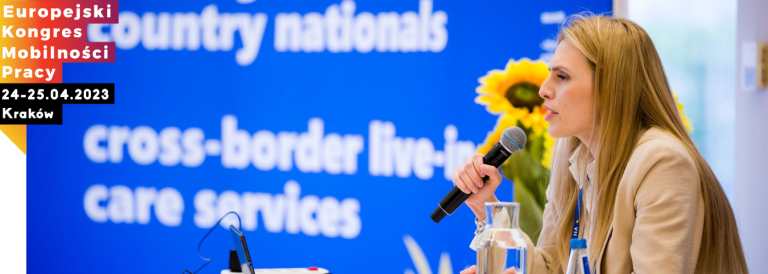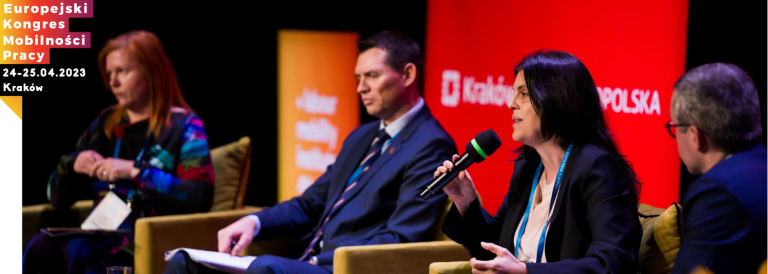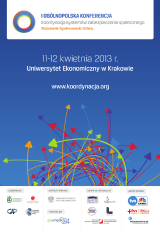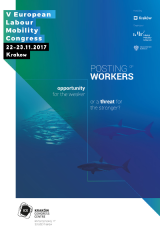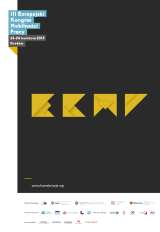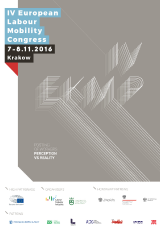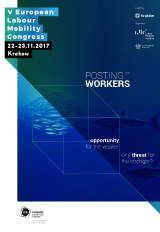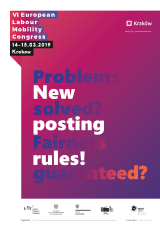



Kalendarium wydarzeń
Konferencja finałowa
Europejski Kongres Mobilności Pracy w Krakowie (EKMP) VII edycja
 Kraków
Kraków
 24 kwietnia, 2023 09:00
24 kwietnia, 2023 09:00
Rozgrzewka
Szkolenie i wsparcie opiekunek i opiekunów oraz standaryzacja jakości usług opieki domowej
 online
online
 31 marca, 2023 12:30
31 marca, 2023 12:30
Rozgrzewka
Delegowanie cudzoziemców obywateli państw trzecich z Polski i do Polski
 Warszawa
Warszawa
 3 marca, 2023 11:00
3 marca, 2023 11:00
Rozgrzewka
[ w przygotowaniu] – Warsztaty: e-formularz-ujednolicenie prostego zgłoszenia
 tbc
tbc
 czerwiec, 2023
czerwiec, 2023
Dlaczego warto?
EKMP to prestiżowe wydarzenia na temat delegowania pracowników i prawnych aspektów transgranicznego świadczenia usług w Unii Europejskiej. Konferencję finałową w Krakowie poprzedza seria mniejszych wydarzeń tematycznych.
EKMP wyróżnia:
- największa liczba uczestników
- pewna wiedza “z pierwszej ręki”
- najlepsi eksperci z wielu państw
- warsztaty tematyczne dla praktyków
- możliwość zadawania pytań
Wydarzenia towarzyszące
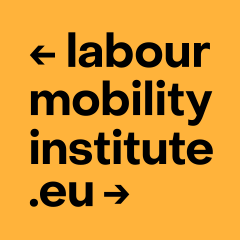
Organizator
Europejski Instytut Mobilności Pracy
ELMI (dawniej Inicjatywa Mobilności Pracy) od 10 lat wspiera swoich członków w rozwiązywaniu problemów prawnych, dotyczących delegowania pracowników, w tym zakresie koordynacji systemów zabezpieczenia społecznego i prawa pracy. Działalność ELMI finansowana jest ze składek i opłat członkowskich, darowizn oraz odpłatnych usług doradczych i szkoleniowych.
Prelegenci poprzednich edycji

Anna Siwiecka
Zakład Ubezpieczeń Społecznych (Centrala)

dr Marco Rocca
CNRS - University of Strasbourg

prof. Stamatia Devetzi
Uniwersytet w Fuldzie

mec. Steffen Pasler
ETL Rechtsanwälte

Zbigniew Bartuś
Dziennikarz, publicysta

Stefan Schwarz
Wioska Ekspertów // Europejski Instytut Mobilności Pracy

Robert Lisicki
Konfederacja Lewiatan

prof. Gertruda Uścińska
Prezes Zakładu Ubezpieczeń Społecznych (PL)

Paweł Kułaga
Polsko - Ukraińska Izba Gospodarcza

mec. Piotr Kozłowski
KOZLOWSKI Rechtsanwälte und Steuerberater

mec. Marta Bledniak L.L.M.
Marta Bledniak Cabinet d'Avocats & DBA

mec. Hanna Stypułkowska-Goutierre
HSG Avocats // Wioska Ekspertów

mec. Dominika Nowak
DLA Piper // Wioska Ekspertów
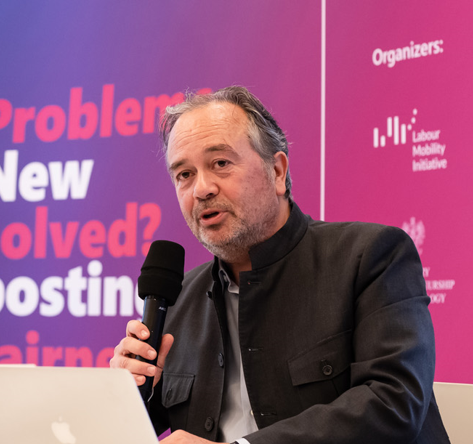
mec. Christophe Wilner
Wilner Avocats

mec. Beata Donay
WENDLER TREMML Rechtsanwälte

Marta Zięba-Szklarska
Świat Kadr // Wioska Ekspertów

Maria Sobieska
Wolters Kluwer // Wioska Ekspertów

Margareta Przybyła
Parlament Europejski

Marek Gadacz
CRIDO // Wioska Ekspertów

Magdalena Grygorowicz
Crede Experto, Inicjtywa Mobilności Pracy // Wioska Ekspertów

Maciej Zakrocki
Dziennikarz

Krzysztof Balon
Wiceprzewodniczący Grupy ds. Różnorodności w Europie EKES-u

Jadwiga Emilewicz
Minister Przedsiębiorczości i Technologii

Jacek Krawczyk
Przewodniczący Grupy Pracodawców EKES

Iwona Kasprzyk-Sowa
Parlament Europejski

inż. Piotr Winiarski
tradeoffice24.com GmbH, Poland Business Center World // Wioska Ekspertów

Hilde Thys
Agoria

Frederic de Wispelaere
Instytut HIVA KU Leuven (BE)

Elżbieta Bieńkowska
Komisarz UE ds. rynku wewnętrznego, przemysłu, przedsiębiorczości i MŚP

dr Marek Benio
Wioska Ekspertów // Europejski Instytut Mobilności Pracy

dr Marcin Wojewódka
Wojewódka i Wspólnicy Sp. k.

dr Marcin Kiełbasa
Wioska Ekspertów // Europejski Instytut Mobilności Pracy

dr Bernd Borgmann
Partner w DLA Piper

Danuta Jazłowiecka
Parlament Europejski

Carlos Trindade
Członek Grupy Pracowników EKES-u

Bruno De Pauw
Belgian National Social Security Office (RSZ/ONSS)

Bruno De Pauw
Belgian National Social Security Office (RSZ/ONSS)

Barbara Surdykowska
NSZZ Solidarność

Anita Debaere
Pearle

Alina Winiarski
Winiarski tradeoffice24.com GmbH, Poland Business Center World // Wioska Ekspertów

Agnieszka Paszkowski
DBA

Piotr Winiarski
tradeoffice24.com GmbH, Poland Business Center World

Anna Siwiecka
Zakład Ubezpieczeń Społecznych (Centrala)
Naczelnik Wydziału Ubezpieczeń Międzynarodowych w Centrali Zakładu Ubezpieczeń Społecznych. Wybitny praktyk i opiniodawca. Ekspert m.in. w zakresie ubezpieczeń pracowników delegowanych w ramach świadczenia usług. Autorytet w sprawach związanych z wyborem ustawodawstwa właściwego oraz stosowania Rozporządzenia Parlamentu Europejskiego i Rady (WE) nr 883/2004 w sprawie koordynacji systemów zabezpieczenia społecznego. W drugim dniu Kongresu corocznie prowadzi cieszące się ogromną popularnością wśród przedsiębiorców praktyczne warsztaty z procedur wnioskowania i wydawania formularzy A1.

dr Marco Rocca
CNRS - University of Strasbourg
Dr Marco Rocca jest naukowcem CNRS na Uniwersytecie w Strasburgu we Francji oraz wykładowcą europejskiego i międzynarodowego prawa pracy (Université de Liège, Belgia). Jego badania doktoranckie, które dotyczyły relacji między delegowaniem pracowników a zbiorowym prawem pracy i zostały opublikowane w książce “Delegowanie pracowników i zbiorowe prawo pracy: tam i z powrotem. Między rynkiem wewnętrznym a prawami podstawowymi “(Intersentia, 2015). Jest członkiem projektu MEAT.UP.FFIRE, finansowanego przez Komisję Europejską DG EMPL, badającego warunki pracy i relacje przemysłowe w sektorze mięsa wieprzowego.

prof. Stamatia Devetzi
Uniwersytet w Fuldzie
Profesor prawa ubezpieczeń społecznych na Uniwersytecie Nauk Stosowanych w niemieckiej Fuldze. Studiowała prawo w Atenach, Rzymie i Osnabrück, uzyskała dyplom z prawa na Wydziale Prawa Uniwersytetu w Atenach (1994) i doktorat z Uniwersytetu w Osnabrück (1998). Po pracy jako ekspert prawny w Niemieckiej Izbie Ubezpieczeń Emerytalnych (1998-2003), w 2003 roku została profesorem w Fuldzie. W latach 2011-2016 była profesorem prawa publicznego i europejskiego prawa ubezpieczeń społecznych na Uniwersytecie w Osnabrück. Od ponad 20 lat aktywnie uczestniczy w nauczaniu i badaniach w dziedzinie ubezpieczeń społecznych, prawa europejskiego i prawa. Ekspert w zakresie europejskich zagadnień koordynacji zabezpieczenia społecznego.

mec. Steffen Pasler
ETL Rechtsanwälte
Prawnik, adwokat od 1998, właściciel kancelarii prawnej ETL Rechtsanwälte. Certyfikowany specjalista w zakresie problematyki zatrudnienia oraz prawa pracy, jak również prawa handlowego. Posiada duże praktyczne doświadczenie w reprezentowaniu w postępowaniach sądowych i kontrolnych oraz doradztwie dla pracodawców, w szczególności z branży opieki domowej oraz firm świadczących usługi transgraniczne. Obecnie głęboko zaangażowany w problematykę niemieckiej płacy minimalnej oraz jej praktycznego stosowania.

Zbigniew Bartuś
Dziennikarz, publicysta
Prowadzący Sesji Plenarnej VI EKMP. Publicysta, reportażysta, felietonista oraz dziennikarz śledczy i gospodarczy Dziennika Polskiego i mediów Grupy Polska Press – czołowych krajowych gazet regionalnych oraz Polski The Times. Wieloletni szef oddziału Dziennika Polskiego w Małopolsce Zachodniej, laureat kilkudziesięciu prestiżowych nagród i wyróżnień dziennikarskich – ogólnopolskich (w tym Wolności Słowa, Grand Press, Dziennikarz Ekonomiczny Roku) i regionalnych (Grand Prix Dziennikarzy Małopolski). Członek Zarządu Fundacji Pamięci Ofiar Auschwitz. Współzałożyciel Klubu Rotary w Oświęcimiu. Członek Stowarzyszenia Alumni (uczestników programów Departamentu Stanu USA).

Stefan Schwarz
Wioska Ekspertów // Europejski Instytut Mobilności Pracy
Organizator Europejskiego Kongresu Mobilności Pracy. Współzałożyciel i prezes Europejskiego Instytutu Mobilności Pracy. Wiceprezes Zarządu Polskiego Forum HR. Członek kapituły nagrody Labor Mobilis. Inicjator skutecznej walki przeciw niekorzystnym zapisom dyrektywy wdrożeniowej 2014/67/UE. Aktywny uczestnik konsultacji społecznych. Brał udział m.in. w obradach okrągłego stołu w ramach projektu Komisji Europejskiej, na których opracowano wytyczne odnoszące się do poszanowania praw człowieka w sektorze HR. Ekspert rynku pracy. Popularyzator idei odpowiedzialnego biznesu. Ekonomista, absolwent Uniwersytetu Ekonomicznego w Krakowie.

Robert Lisicki
Konfederacja Lewiatan
Absolwent prawa na Uniwersytecie Warszawskim. Ukończył aplikację radcowską przy Warszawskiej Okręgowej Izbie Radców Prawnych i uzyskał tytuł radcy prawnego. W latach 2004-2016 pracował w Departamencie Prawa Pracy Ministerstwa Pracy i Polityki Społecznej, w którym od 2013 r. pełnił funkcję naczelnika Wydziału Międzynarodowego Prawa Pracy. Uczestnik prac legislacyjnych na poziomie unijnym (m.in. nad dyrektywą w sprawie czasu pracy, dyrektywą ws. pracowników tymczasowych) oraz krajowym (m.in. zmiany kodeksowych regulacji czasu pracy, umów terminowych). Od wielu lat specjalizuje się w praktycznych zagadnieniach prawa pracy, prowadząc szkolenia i wykłady z zakresu prawa pracy. Autor publikacji z zakresu polskiego i unijnego prawa pracy. W Konfederacji Lewiatan odpowiada za obszar międzynarodowego i krajowego prawa pracy oraz koordynacji systemów zabezpieczenia społecznego.

prof. Gertruda Uścińska
Prezes Zakładu Ubezpieczeń Społecznych (PL)
Profesor doktor habilitowany, prezes Zakładu Ubezpieczeń Społecznych, kierownik Zakładu Zabezpieczenia Społecznego w Instytucie Polityki Społecznej Uniwersytetu Warszawskiego, profesor w Zakładzie Prawa Pracy i Zabezpieczenia Społecznego Instytutu Pracy i Spraw Socjalnych. Członek Komitetu Nauk o Pracy i Polityce Społecznej Polskiej Akademii Nauk, ekspert w programach badawczych uczelni wyższych i instytutów naukowo-badawczych państw członkowskich Unii Europejskiej (uniwersytety w Antwerpii i Gandawie, Instytut Maksa Plancka i in.) w związku z realizacją programów unijnych (Consensus, Special, LAW, trESS, FreSsco), kierownik i ekspert w projektach polskich i międzynarodowych. Autorka wielu publikacji z zakresu polityki społecznej, zabezpieczenia społecznego, ubezpieczenia społecznego, prawa europejskiego.

Paweł Kułaga
Polsko - Ukraińska Izba Gospodarcza
Przewodniczący Komitetu ds. Migracji Zarobkowej Polsko-Ukraińskiej Izby Gospodarczej. Ekspert kampanii społecznej ,,Partnerstwo i Zatrudnienie’’. Prezes zarządu Foreign Personnel Service sp. z o.o. oraz Greygoose Outsourcing sp. z o.o., wiodących spółek na polskim rynku zatrudnienia cudzoziemców. Prawnik, absolwent Uniwersytetu Mikołaja Kopernika w Toruniu, stypendysta Uniwersytetu w Cambridge, doktorant Uniwersytetu Jagiellońskiego w Krakowie.

mec. Piotr Kozłowski
KOZLOWSKI Rechtsanwälte und Steuerberater
Niemiecki Adwokat i założyciel kancelarii adwokackiej i podatkowej KOZLOWSKI, specjalizującej się w obsłudze polskich spółek w Niemczech. Obsługuje od strony prawnej i podatkowej wiele polskich przedsiębiorstw delegujących pracowników do Niemiec. Jego doświadczenie obejmuje problematykę niemieckiego i międzynarodowego prawa podatkowego, w szczególności kwestie działalności transgranicznej polskich i międzynarodowych grup kapitałowych. Posiada tytuł Fachanwalt für Steuerrecht-adwokat specjalista prawa podatkowego. Z uczestnikami EKMP podzieli się praktycznymi doświadczeniami związanymi z oddelegowaniem pracowników z Polski do Niemiec i bieżącą obsługą księgową oddelegowania. Przedstawi obowiązki podatkowe pracodawców, najczęściej pojawiające się problemy i sposoby ich rozwiązywania. Posługuje się biegle i doradza Klientom w językach: polskim, niemieckim i angielskim.

mec. Marta Bledniak L.L.M.
Marta Bledniak Cabinet d'Avocats & DBA
Adwokat Marta Błędniak jest założycielem polsko – francuskiej kancelarii prawnej w Tuluzie, specjalizującej się w kompleksowej obsłudze prawnej firm i osób fizycznych a w szczególności przedsiębiorców polskich działających już na francuskim rynku lub zamierzających rozpocząć działalność we Francji. Adwokat Marta Błędniak interweniuje w zakresie prawa handlowego, prawa gospodarczego, prawa transportowego, prawa pracy a w szczególności świadczy kompleksowe porady prawne w zakresie oddelegowania pracowników (zaliczki, odcinki, wynagrodzenie minimalne etc).

mec. Hanna Stypułkowska-Goutierre
HSG Avocats // Wioska Ekspertów
Adwokat, Prezes Polchambers, Zrzeszenia Polskich Izb Handlowych za granicą, członek Zarządu MEDEF Paris, Konfederacji Francuskich Pracodawców. Od 35 lat prowadzi kancelarię prawną HSG Avocats w Paryżu. Specjalizuje się w międzynarodowych transakcjach i kontraktach oraz francuskim i europejskim prawie pracy, w tym we wszystkich aspektach praktycznych i prawnych delegowania pracowników do Francji. Ma doświadczenie w doradztwie prawnym oraz w sporach z zakresu prawa pracy i prawa handlowego. Od lat pomaga i wspiera polskie firmy na rynku francuskim oraz innych rynkach dzięki sieci kancelarii adwokackich do której należy.

mec. Dominika Nowak
DLA Piper // Wioska Ekspertów
Posiada wieloletnie doświadczenie w obsłudze międzynarodowych przedsiębiorstw w obszarze prawa pracy, w szczególności w zakresie: wsparcia prawnego przy rozpoczęciu i rozwijaniu działalności na rynku polskim, przygotowania, wdrożenia oraz zmian dokumentacji prawno-pracowniczej. Zapewnia bieżące wsparcie w zakresie indywidualnego prawa pracy, w kwestiach związanych z czasem pracy, dyskryminacją oraz mobbingiem, rozwiązaniem stosunku pracy, odpowiedzialnością materialną i porządkową pracowników, outsourcingiem. Ponadto, doradza klientom różnych branży odnośnie prawno-pracowniczych aspektów transakcji korporacyjnych, zwolnień grupowych oraz specjalizuje się w rozwiązywaniu sporów – polubownie i na drodze sądowej. Prowadzi praktykę DLA Mobility w Polsce, oferującą wsparcie w sprawach imigracyjnych, w szczególności w zakresie delegowania polskich i zagranicznych pracowników oraz legalizacji pobytu i pracy.

mec. Christophe Wilner
Wilner Avocats
Absolwent Université Paris-V, na którym ukończył prawo bankowe i finansowe oraz prawo biznesowe i podaatkowe, członek paryskiej palestry. Mówi płynnie po polsku, angielsku i francusku. W praktyce zajmuje się głównie ogólnym systemem opodatkowania, prawem biznesowym oraz prawem pracy, w tym m. in. prawem karnym pracy.

mec. Beata Donay
WENDLER TREMML Rechtsanwälte
Beata Donay ukończyła prawo na Uniwersytecie w Kolonii. Od 2004 roku jest adwokatem (Rechtsanwältin) w kancelarii WENDLER TREMML w Düsseldorfie i zajmuje się głównie doradztwem na rzecz przedsiębiorstw zagranicznych wykonujących usługi w Niemczech i delegujących pracowników w tym celu do Niemiec. Specjalizuje się w prawie pracy, ze szczególnym uwzględnieniem kwestii delegowania pracowników oraz zagadnień transgranicznych w prawie pracy i ubezpieczeń społecznych. Współautorka poradnika z serii „ABC polskiego przedsiębiorcy w Niemczech” na temat wybranych zagadnień związanych z kontrolami przeprowadzanymi przez niemieckie urzędy i instytucje.

Marta Zięba-Szklarska
Świat Kadr // Wioska Ekspertów
Ekspert w zakresie HR, kadr, płac i transgranicznego zatrudnienia. Interim Manager w obszarze doradztwa, rozwoju biznesu w Polsce i w projektach międzynarodowych, również w obszarze finansów osobistych. Certyfikowany “Financial Adviser EFG® i EFC®” oraz Dyrektor ds. Rozwoju Międzynarodowego w European Federation of Financial Professionals in Poland. Współpracuje z firmami doradczymi, kancelariami, izbami, instytucjami rynku pracy, oraz organizacjami na terenie Polski i całego świata. Zaangażowana w projekty społeczne, aktywizację zawodową osób niepełnosprawnych i zarządzanie kosztami PFRON z Fundacja REAXUM. Ambasadorka Przedsiębiorczości Kobiet i Mentor w programach Fundacji Przedsiębiorczości Kobiet oraz VITAL Voices Chapter Poland. Karierę zawodową rozpoczęła w 1997 roku na rynku finansowym i do dziś łączy finanse z HR wierząc, że to dwie nierozerwalne kwestie.

Maria Sobieska
Wolters Kluwer // Wioska Ekspertów
Prawnik, ekspert z zakresu prawa pracy, płac i ubezpieczeń społecznych. Wieloletni praktyk, posiada ponad dziesięcioletni staż pracy w dużych międzynarodowych korporacjach, w tym również outsourcingu – w zakresie dostarczania i realizowania usług kadrowo-płacowych. W zakresie swoich dotychczasowych obowiązków osoba odpowiedzialna za tworzenie opinii prawnych i doradztwo wewnętrzne w bieżących sprawach z zakresu twardego HR – w tym płac ale też praktyczne wykonywanie zadań z tego obszaru. W swojej karierze realizowała projekty wdrożenia i obsługę systemów kadrowo płacowych (SAP, TETA) i tworzenia koncepcji tych systemów pod kątem rozwiązań prawnych z uwzględnieniem potrzeb wewnętrznych klienta. Autorka opinii, komentarzy i praktycznych poradników, która od kilku lat pracuje w Wolters Kluwer Polska, a także konsultingu. Trener i szkoleniowiec w zakresie tematyki prawa pracy, płac i ubezpieczeń społecznych.

Margareta Przybyła
Parlament Europejski
Doradczyni Europoseł Danuty Jazłowieckiej. Od 2009 roku pracuje w Parlamencie Europejskim, przy Komisji Zatrudnienia i Spraw Socjalnych. Współpracowała z Europosłanką Danutą Jazłowiecką między innymi nad Dyrektywą wdrożeniową dotyczącą delegowania pracowników oraz obecnie nad rewizją dyrektywy o delegowaniu z 1996 roku. Absolwentka Uniwersytetu Ekonomicznego w Poznaniu, na kierunku Europeistyka. Od 2006 r. mieszka w Brukseli, gdzie zdobywała doświadczenie m.in. w Stałym Przedstawicielstwie Polski przy UE oraz w sektorze doradztwa europejskiego. W obecnej kadencji PE zajmowała się Pakietem Mobilności, rewizją rozporządzeń dot. koordynacji systemów zabezpieczenie społecznego, powołaniem Europejskiego Urzędu ds. Pracy czy dyrektywą ws. przejrzystych i przewidywalnych warunków zatrudnienia.

Marek Gadacz
CRIDO // Wioska Ekspertów
Partner w zespole doradztwa podatkowego w CRIDO. Specjalizuje się w różnych aspektach związanych z opodatkowaniem osób fizycznych, w szczególności doradztwie w zakresie planowania podatkowego, bieżących rozliczeń podatkowych i ubezpieczeń społecznych, opodatkowania transferu majątku czy przeprowadzania audytów podatkowych, a także zwiększania efektywności podatkowej prowadzonej działalności. W ramach dotychczasowej praktyki doradzał zarówno firmom, jak i bezpośrednio osobom fizycznym w zakresie struktur wynagradzania pracowników oraz uzyskiwania przez nich innych dochodów. Marek posiada kilkunastoletnie doświadczenie w zakresie doradztwa podatkowego. Swoją karierę rozpoczął w 1997 r. w Arthur Andersen, kontynuował w Ernst&Young, a przez ostatnie lata był starszym menedżerem w dziale doradztwa podatkowego PwC.

Magdalena Grygorowicz
Crede Experto, Inicjtywa Mobilności Pracy // Wioska Ekspertów
Gorąca zwolenniczka prowadzenia globalnej działalności gospodarczej, wspierająca polskie firmy w ekspansji na rynki europejskie. Od 2005r jako certyfikowana księgowa i właścicielka kancelarii podatkowej, specjalizuje się w usługowym doradztwie w zakresie zatrudniania transgranicznego, zasad świadczenia usług za granicą, rachunkowości finansowej i zarządczej, a także zarządzania finansowego, prawa gospodarczego, prawa podatkowego krajowego i zagranicznego. Ukończyła studia na Politechnice Łódzkiej i Uniwersytecie Łódzkim na kierunkach Organizacja i Zarządzanie, Europeistyka oraz Rachunkowość i Zarządzanie Finansowe. Wykształcenie z ww. zakresów i pasja inżynierska pozwala jej łączyć w praktyce zawodowej zagadnienia techniczne, prawne, księgowość i rachunkowość z problematyką menedżerską i zarządzaniem strategicznym w polskich przedsiębiorstwach świadczących usługi za granicą. Aktywnie współpracuje z firmami z branży budowlanej, telekomunikacyjnej oraz pracy tymczasowej.

Maciej Zakrocki
Dziennikarz
Moderator sesji plenarnej VI EKMP. Absolwent Wydziału Dziennikarstwa Uniwersytetu Warszawskiego. Pracował dla TVP przez prawie 30 lat, gdzie zaczął od bardzo popularnego programu „Sensacje XX wieku”. Od kilkunastu lat zajmuje się problematyką europejską, śledził z bliska proces akcesji Polski do UE, przygotowując dla TVP INFO z każdej sesji plenarnej Parlamentu Europejskiego program z cyklu “Debata po europejsku” . Drugą pasją Macieja Zakrockiego jest dialog społeczny, czego zawodowym wyrazem jest autorski był “Debata Trójstronna” w TVP. .W 2014 r. dołączył do TOK FM, gdzie oprócz swoich wystąpień jako publicysta w różnych audycjach prowadzi kilka programów, takich jak „Co się stało” i „Europejski magazyn”.

Krzysztof Balon
Wiceprzewodniczący Grupy ds. Różnorodności w Europie EKES-u
Został mianowany członkiem Europejskiego Komitetu Ekonomiczno-Społecznego (EKES) w 2010 r, pełni funkcję przewodniczącego grupy analitycznej ds. Opinii EKES-u w sprawie rewizji dyrektywy dotyczącej delegowania pracowników, 2016 r. (SOC / 541). W 2015 r. Został wybrany na współprzewodniczącego kategorii Gospodarka społeczna, a w 2018 r. na stanowisko wiceprzewodniczącego Grupy EKZZ III Różnorodność w Europie. Urodzony w Krakowie (Polska), jest przewodniczącym Komitetu Programowego Społeczności Roboczej Stowarzyszeń Organizacji Społecznych (parasol dla ponad 800 organizacji non-profit) oraz wiceprzewodniczącym Polskiego Komitetu ds. Europejskiej walki z Ubóstwem Sieć. Od 2003 roku jest również członkiem i współprzewodniczącym 2012-2018 – reprezentuje organizacje pozarządowe – Rady ds. Świadczeń Publicznych Rzeczypospolitej Polskiej (konsultacyjny międzysektorowy organ prawny na rzecz rozwoju społeczeństwa obywatelskiego).

Jadwiga Emilewicz
Minister Przedsiębiorczości i Technologii
W 2018 roku została powołana na stanowisko ministra przedsiębiorczości i technologii. Od 2015 do 2018 roku pełniła funkcję Podsekretarza Stanu w Ministerstwie Rozwoju. W latach 1999-2002 pracowała w Departamencie Spraw Zagranicznych Kancelarii Prezesa Rady Ministrów. Jest radną Sejmiku Województwa Małopolskiego i Przewodniczącą Komisji Innowacji i Nowoczesnych Technologii. Absolwentka Instytutu Nauk Politycznych Uniwersytetu Jagiellońskiego. Na Wydziale Studiów Międzynarodowych i Politycznych UJ otworzyła przewód doktorski. Jest stypendystką Uniwersytetu Oxford oraz programu American Council on Germany, Dräger Foundation, ZEIT-Stiftung Ebelin und Gerd Bucerius. Związana z Wyższą Szkołą Europejską im. ks. J. Tischnera w Krakowie. Działaczka społeczna, autorka wielu publikacji naukowych. Była prezesem Fundacji Lepsza Polska. Zna język angielski, niemiecki i francuski.

Jacek Krawczyk
Przewodniczący Grupy Pracodawców EKES
Przewodniczący grupy pracodawców Europejskiego Komitetu Społeczno-Ekonomicznego (EKES), wiceprezydent Konfederacji Lewiatan, największej polskiej organizacji przedsiębiorców sektora prywatnego. W latach 2010-2013 pełnił funkcję wiceprzewodniczącego EKES, odpowiedzialnego za finanse. Był również szefem Komitetu ds. kontynuacji więzi transatlantyckich EKES (2015-18) oraz CEO banków oraz spółek listowanych na warszawskiej Giełdzie Papierów Wartościowych. Ponadto, przewodniczył i zasiadał w licznych radach nadzorczych i organach spółek różnych branż, w tym: IT, transportu, ubezpieczeń i lotnictwa. Absolwent prawa na Uniwersytecie Warszawskim oraz HEC Paris programów INSEAD w Fontainebleu i Eisenhower.

Iwona Kasprzyk-Sowa
Parlament Europejski
Absolwentka Universita’ degli Studi di Perugia i Universita’ degli Studi di Roma La Sapienza, na wydziałach nauk politycznych. Doradca parlamentarny w Parlamencie Europejskim od 2010 roku, w biurze Europoseł Danuty Jazłowieckiej, w zakresie obejmującym prace komisji ds.zatrudnienia i spraw socjalnych PE oraz w zakresie Public Relations obejmującym działalność polityczną Europosłanki. Specjalizacja w dziedzinie mobilności pracy i usług na rynku wewnętrznym UE, szczególnie w zakresie delegowania pracowników. Doradca aktywny w procesie legislacyjnym obejmującym negocjacje międzyinstytucjonalne dotyczące Dyrektywy wdrożeniowej dot.Delegowania pracowników 2014/67/UE w latach 2012-2014.

inż. Piotr Winiarski
tradeoffice24.com GmbH, Poland Business Center World // Wioska Ekspertów
Prezes i współwłaściciel spółki tradeoffice24.com GmbH z siedzibą w Berlinie oraz prezydent Światowego Stowarzyszenia Poland Business Center World z siedzibą główną w Wiedniu. Od roku 1998 wspiera aktywnie firmy polskie w ich ekspansji na rynki europejskie, szczególnie na rynek niemiecki. Oferuje wraz z partnerami kompleksowe doradztwo, zakładanie i prowadzenie spółek w Niemczech wraz z pełną obsługą prawną, podatkową, adresem i serwisem biurowym. Ekspert w zakresie marketingu międzynarodowego, technologii, budowania strategii wejścia na rynki zagraniczne.

Hilde Thys
Agoria
Hilde Thys pracuje jako szef zatrudnienia międzynarodowego w „Agoria”, belgijskiej federacji pracodawców dla przemysłu technologicznego, gdzie zajmuje się międzynarodowym zatrudnieniem. Jest także przewodniczącą Komitetu UE w Ceemet, Europejskiego Technika i Pracodawców Przemysłu, które reprezentuje 200 000 firm zapewniających 35 milionów miejsc pracy. Posiada 20-letnie doświadczenie w doradztwie dla firm zajmujących się aspektami społecznymi, imigracyjnymi i podatkowymi. Jej praktyczne i prawne doświadczenie jest przydatne w jej kontaktach z Brukselą. Dokładnie wie, jakie pytania mają firmy i gdzie są bariery w odniesieniu do delegowania pracowników. Ukończyła studia prawnicze na Uniwersytecie w Leuven oraz LL.M. Prawo europejskie Uniwersytetu Sztokholmskiego.

Frederic de Wispelaere
Instytut HIVA KU Leuven (BE)
Współautor największych w historii badań na temat delegowania pracowników. Frederic De Wispelaere pełni funkcję Senior Researcher’a w Instytucie HIVA na Uniwersytecie Katolickim w Leuven. Posiada dyplom MBA (EHSAL – Brussels) oraz w zakresie prawa korporacyjnego (Ghent University). Obecnie jest zaangażowany w badania statystyczne (Network Statistics) na temat swobodnego przepływu pracowników, zabezpieczenia społecznego, koordynacji, a także błędów i nadużyć. Sieć powstała z inicjatywy komitetu DG EMPL w Komisji Europejskiej w celu zbierania i analizy danych w powyższym zakresie. W ramach sieci jest odpowiedzialny m.in. za przygotowanie corocznego raportu nt. delegowania pracowników. Ponadto, jest autorem publikacji i raportów na temat delegowania z perspektywy państw wysyłających i przyjmujących.

Elżbieta Bieńkowska
Komisarz UE ds. rynku wewnętrznego, przemysłu, przedsiębiorczości i MŚP
Od 2014 roku Europejski Komisarz ds. Rynku Wewnętrznego i Usług. W latach 2007–2013 minister rozwoju regionalnego, w latach 2011–2014 senator VIII kadencji, w latach 2013–2014 wiceprezes Rady Ministrów oraz minister infrastruktury i rozwoju.

dr Marek Benio
Wioska Ekspertów // Europejski Instytut Mobilności Pracy
Prawnik, doktor nauk ekonomicznych. Przewodniczący Komitetu Organizacyjnego V EKMP. Wiceprezes Stowarzyszenia Inicjatywa Mobilności Pracy, Członek honorowy Małopolskiego Oddziału Polskiego Stowarzyszenia Ubezpieczenia Społecznego, fundator Fundacji Gospodarki i Administracji Publicznej. Twórca Pracowni Legalnego Delegowania – mechanizmu transferu wiedzy między środowiskiem nauki, biznesu i administracji. Uczestnik konsultacji społecznych i autor kluczowych opinii prawnych na temat zapisów dyrektywy wdrożeniowej, rewizji dyrektywy podstawowej oraz rozporządzeń o koordynacji systemów ubezpieczenia społecznego. Nauczyciel akademicki. Wykłada prawo pracy i ubezpieczenia społeczne na Uniwersytecie Ekonomicznym w Krakowie. Propagator debat oksfordzkich. Tutor. Promotor ponad 200 prac magisterskich i dyplomowych. Dwukrotny laureat studenckiej nagrody „Mentora” w kategorii Innowator.

dr Marcin Wojewódka
Wojewódka i Wspólnicy Sp. k.
Radca prawny, doktor nauk ekonomicznych, założyciel Wojewódka i Wspólnicy Sp.k., kancelarii specjalizującej się w prawie pracy i ubezpieczeniach społecznych. Członek Stowarzyszenia Prawa Pracy. Absolwent WPiA Uniwersytetu Warszawskiego oraz Studiów Podyplomowych Psychologia Zarządzania Personelem. W 2011 r. obronił pracę doktorską pt. „Pracownicze program emerytalne, jako forma dodatkowego zabezpieczenia na starość w Polsce. Ocena funkcjonowania”. Posiada ponad 15-letnie doświadczenie zawodowe w zakresie prawa pracy i świadczeń pracowniczych, które zdobył w wiodących firmach doradczych, takich jak Arthur Andersen oraz Mercer Human Resource Consulting. Doradzał kilkudziesięciu pracodawcom w Polsce w zakresie prawa pracy oraz świadczeń pracowniczych. Specjalizuje się w świadczeniach pracowniczych, zbiorowych stosunkach pracy oraz postępowaniach sądowych z zakresu prawa pracy. Wiceprezes ZUS w latach 2016-2017.

dr Marcin Kiełbasa
Wioska Ekspertów // Europejski Instytut Mobilności Pracy
Doktor nauk prawnych (specjalizacja: prawo europejskie) Uniwersytetu Jagiellońskiego, tłumacz języka angielskiego (m.in. polskiego Kodeksu cywilnego na j. angielski) i włoskiego. Wykładowca na studiach z zakresu angielskich tłumaczeń prawniczych Katedry UNESCO UJ. Absolwent aplikacji radcowskiej w OIRP Kraków oraz Szkoły Prawa Amerykańskiego UJ i The Catholic University of America Columbus School of Law. Specjalizuje się w prawie gospodarczym Unii Europejskiej, ze szczególnym uwzględnieniem prawa rynku wewnętrznego UE, delegowania pracowników oraz w zagadnieniach transgranicznych w prawie pracy i ubezpieczeń społecznych.

dr Bernd Borgmann
Partner w DLA Piper
Dr Bernd Borgmann doradza firmom od 20 lat i ma doświadczenie we wszystkich aspektach niemieckiego i europejskiego prawa pracy, w szczególności w sytuacjach krytycznych, takich jak rokowania i procedury zbiorowe. Oprócz prawem pracy zajmuje się również compliance oraz kwestiami zabezpieczenia społecznego. Jego praca obejmuje również kwestie związane z przepisami dotyczącymi ochrony danych związanych z zatrudnieniem; brał udział w wielu (transgranicznych) projektach ochrony danych w branży HR.

Danuta Jazłowiecka
Parlament Europejski
Posłanka do Parlamentu Europejskiego VII i VIII kadencji, gdzie jest członkiem Komisji Zatrudnienia i Spraw Społecznych. Zajmuje się m.in. kwestiami mobilności pracy, ochrony pracowników zatrudnionych za granicą oraz niwelowania administracyjnych obciążeń przedsiębiorstw i wspieraniem tworzenia nowych miejsc pracy. Laureatka nagrody Labor Mobilis 2013. Kierowała pracami Parlamentu Europejskiego związanymi z projektem dyrektywy wdrożeniowej dotyczącej delegowania pracowników. Autorka m.in. opinii ws. Europejskiego Funduszu na rzecz Inwestycji Strategicznych, opinii w sprawie inwestycji na rzecz wzrostu gospodarczego i zatrudnienia.

Carlos Trindade
Członek Grupy Pracowników EKES-u
Carlos Trindade jest przewodniczącym Grupy EKES-u ds. Imigracji i integracji od 2018 r, pełni także funkcję i przewodniczącego grupy ds. Imigracji i integracji EKES-u oraz sprawozdawcy opinii EKES-u w sprawie europejskiego urzędu pracy, 2018 (SOC / 580) . Wcześniej był przewodniczącym EKES-u Obserwatorium Rynku Pracy (2015-2018). Jest członkiem Komitetu Wykonawczego i Rady Narodowej portugalskiej Generalnej Konfederacji Robotników (CGTP-IN). Jest także Przewodniczącym Rady Zgromadzenia Ogólnego STAD (Związku Pracowników Concierge, Nadzoru, Sprzątania, Gospodarstwa Domowego i Różnych Działalności). Carlos Trindade jest absolwentem socjologii i magistrem historii nowoczesnej i współczesnej, specjalizującego się w stosunkach międzynarodowych, z University Institute of Lisbon (Instituto Universitario de Lisboa).

Bruno De Pauw
Belgian National Social Security Office (RSZ/ONSS)
Aktywny w dziedzinie koordynacji międzynarodowego zabezpieczenia społecznego od 1995 roku, jego podstawowym obszarem specjalizacji jest określenie ustawodawstwa obowiązującego mobilnych pracowników. Obecnie pracuje w belgijskim krajowym biurze zabezpieczenia społecznego jako doradca generalny odpowiedzialny za zespół oddanych ekspertów w Departamencie Stosunków Międzynarodowych. Adwokat z wykształcenia i urzędnik państwowy, porusza temat zarówno z prawnego, jak i praktycznego punktu widzenia. Jako jeden z architektów mechanizmu deklaracji LIMOSA jest odpowiedzialny za zarządzanie i różne jej aktualizacje online.

Bruno De Pauw
Belgian National Social Security Office (RSZ/ONSS)
Active in the field of international social security coordination since 1995, his primary field of expertise is the determination of the legislation applicable on a mobile worker. He currently works for the Belgian National Social Security Office as Advisor-general in charge of a team of dedicated experts in the Department for International Relations. Lawyer by education and civil servant, he covers the subject both from a juridical and practical point of view. As one of the architects of the LIMOSA declaration mechanism he is in charge of the management and the various updates of this online application.

Barbara Surdykowska
NSZZ Solidarność
Pracuje w Biurze Eksperckim przy KK NSZZ Solidarność, gdzie zajmuje się wsparciem prawnym struktur związku zawodowego podczas różnorodnych negocjacji oraz ekspertem NSZZ Solidarność w Zespole Problemowym Ubezpieczeń Społecznych RDS. Współpracownik katedry prawa pracy Uniwersytetu Kardynała Stefana Wyszyńskiego w Warszawie oraz korespondent Fundacji Dublińskiej Eurofound. Autorka artykułów dotyczących między innymi europejskiego dialogu społecznego, rokowań w korporacjach ponadnarodowych oraz roli związków zawodowych w semestrze europejskim. Przedmiotem zainteresowań badawczych jest europeizacja stosunków przemysłowych.

Anita Debaere
Pearle
Anita Debaere jest dyrektorem Pearle * -Live Performance Europe. Ta europejska federacja branżowa liczy, poprzez swoje stowarzyszenia członkowskie, ponad 10 000 organizacji działających w sektorze performance na terenie całej Europy. Pearle * jest również uznawana za europejskie stowarzyszenie pracodawców, biorąc udział w europejskim sektorowym dialogu społecznym. Anita Debaere jest magistrem nauk politycznych i społecznych oraz nauki o komunikacji na Uniwersytecie w Ghent. Ma również stopień naukowy w dziedzinie zarządzania sztuką na City University of London. Anita Debaere pracowała w sektorze muzyki klasycznej i sektorze energetycznym, zanim dołączyła do Pearle *. Kwestie mobilności była obecna przez całą jej karierę.

Alina Winiarski
Winiarski tradeoffice24.com GmbH, Poland Business Center World // Wioska Ekspertów
Współwłaścicielka spółki tradeoffice24.com GmbH z siedzibą w Berlinie oraz członek zarządu Światowego Stowarzyszenia Poland Business Center World z siedzibą główną w Wiedniu. Od roku 1998 wspiera aktywnie firmy polskie w ich ekspansji na rynki europejskie, szczególnie na rynek niemiecki. Oferuje wraz z partnerami kompleksowe doradztwo, zakładanie i prowadzenie spółek w Niemczech wraz z pełną obsługą prawną, podatkową, adresem i serwisem biurowym. Dysponuje dużym praktycznym doświadczeniem w obsłudze firm delegujących pracowników do Niemiec.

Agnieszka Paszkowski
DBA
Absolwentka kierunku finanse i bankowość Szkoły Głównej Handlowej w Warszawie oraz Zarzadzania i Ekonomii na Uniwersytecie Paris-Est Marne-la-Vallée we Francji, Agnieszka Paszkowski posiada 16-to letnie doświadczenie we współpracy francusko-polskiej. Od 2007 roku jest odpowiedzialna za dział francusko-polski biura rachunkowego DBA, którego zadaniem jest dostarczanie kompleksowych rozwiązań w zakresie oddelegowania, rachunkowości, podatków i ubezpieczeń społecznych dla polskich firm działających na rynku francuskim. W ramach zaangażowania we francusko-polski ekosystem i we współpracę z lokalnymi administracjami, takimi jak Ambasada RP w Paryżu, Polska Izba Handlowo-Przemysłowa, Ministerstwo Pracy i Ministerstwo Finansów, pomaga polskim inwestorom i przedsiębiorcom “zrozumieć” złożoność rynku francuskiego.

Piotr Winiarski
tradeoffice24.com GmbH, Poland Business Center World
Prezes i współwłaściciel spółki tradeoffice24.com GmbH z siedzibą w Berlinie oraz prezydent Światowego Stowarzyszenia Poland Business Center World z siedzibą główną w Wiedniu. Od roku 1998 wspiera aktywnie firmy polskie w ich ekspansji na rynki europejskie, szczególnie na rynek niemiecki. Oferuje wraz z partnerami kompleksowe doradztwo, zakładanie i prowadzenie spółek w Niemczech wraz z pełną obsługą prawną, podatkową, adresem i serwisem biurowym. Ekspert w zakresie marketingu międzynarodowego, technologii, budowania strategii wejścia na rynki zagraniczne.
Gala Labor Mobilis


Nagroda Labor Mobilis jest szczególną formą wyróżniania osób, które wniosły szczególny wkład w zwalczanie barier w swobodzie świadczenia usług na jednolitym rynku Unii Europejskiej.
Statuetka pierwszy raz wręczona została w 2013 roku, a jej fundatorem jest Europejski Instytut Mobilności Pracy (ELMI).







Tematy wiodące aktualnej edycji
Rada Programowa

prof. Jacek Majchrowski
Prezydent Krakowa

Tanel Feldman
Immigration Law Associates

prof. Catherine Barnard
Uniwersytet w Cambridge (UK)

Ewald Oberhammer
Oberhammer Rechtsanwälte GmbH

dr Zsolt Darvas
Uniwersytet Corvinusa w Budapeszcie (HU)

Frederic de Wispelaere
Instytut HIVA KU Leuven (BE)

prof. Leszek Mitrus
Uniwersytet Jagielloński (PL)

Stefan Schwarz
Prezes Europejskiego Instytutu Mobilności Pracy (PL)

prof. Arkadiusz Sobczyk
Uniwersytet Jagielloński (PL)

prof. Wanda Sułkowska
Uniwersytet Ekonomiczny w Krakowie (PL)

dr Marek Benio
Uniwersytet Ekonomiczny w Krakowie (PL)

prof. Gertruda Uścińska
Prezes Zakładu Ubezpieczeń Społecznych (PL)

dr Magdalena Bernaciak
Europejski Instytut Związków Zawodowych ETUI (BE)

prof. Jacek Majchrowski
Prezydent Krakowa
Prezydent Krakowa od 2002 r., 4 listopada 2018 r. wybrany na piątą kadencję. Prawnik, profesor Uniwersytetu Jagiellońskiego, profesor zwyczajny nauk prawnych, historyk doktryn politycznych i prawnych. Znawca II Rzeczypospolitej, dokumentujący jej historię, a szczególnie działalność ugrupowań prawicowych. Był zastępcą przewodniczącego Trybunału Stanu (w latach 2001-2005), do listopada 2011 r. – sędzia Trybunału Stanu.

Tanel Feldman
Immigration Law Associates
Starszy Partner w Kancelarii Immigration Law Associates (ILA) EU Labour Mobility Solutions od 2000 r., Członek Międzynarodowej Izby Adwokatów i Radców Prawnych (International Bar Association) Tanel Feldman koncentruje się w swojej praktyce na zagadnieniach koordynacji zabezpieczenia społecznego, prawa pracy dotyczących wewnątrz unijnej mobilności oraz interoperacyjności pomiędzy regulacjami dotyczącymi zabezpieczenia społecznego a prawa pracy.
Tanel aktywnie działa na rzecz polepszenia wzajemnych relacji między debatą akademicką a praktyką oraz broni zasady pierwszeństwa prawa UE jako istniejącej możliwości, a nie ograniczenia działalności na rynku wewnętrznym UE.

prof. Catherine Barnard
Uniwersytet w Cambridge (UK)
Profesor prawa Unii Europejskiej na Uniwersytecie w Cambridge.
Jeden z najbardziej uznanych międzynarodowych autorytetów w dziedzinie europejskiego rynku wewnętrznego i prawa pracy.

Ewald Oberhammer
Oberhammer Rechtsanwälte GmbH
Oberhammer Rechtsanwälte GmbH specjalizuje się w dziedzinie prawa imigracyjnego i prawa pracy, w szczególności związanego z zatrudnianiem obcokrajowców w Austrii i międzynarodowym oddelegowaniem do austriackich przedsiębiorstw, jak również z prywatnymi klientami międzynarodowymi, którzy chcą założyć firmę w Austrii.
Obejmuje to doradztwo w zakresie prawa pracy i prawa korporacyjnego, odpowiedzi na pytania dotyczące prawa imigracyjnego, sporządzanie umów o pracę/projektów/przydziałów, ubieganie się o wizy i wiele innych powiązanych kwestii. Nasi klienci ufają naszemu doświadczeniu w zakresie migracji korporacyjnej.
Ponadto oferujemy wszystkie niezbędne usługi dodatkowe, takie jak osobiste towarzyszenie w spotkaniach z odpowiednimi urzędami oraz wspieranie klientów w ubieganiu się o dotacje i ubezpieczenia zdrowotne. Nasi klienci mają więc tę zaletę, że są obsługiwani przez prawniczy “one-stop shop”.

dr Zsolt Darvas
Uniwersytet Corvinusa w Budapeszcie (HU)
Członek brukselskiego think tanku Bruegel, doktor nauk ekonomicznych Uniwersytetu Corvinusa w Budapeszcie, gdzie od 1994 r. prowadzi kursy ekonometrii. Przed przystąpieniem do Bruegel był doradcą ds. badań w Argenta Financial Research Group w Budapeszcie. Wcześniej pracował w jednostce badawczej Banku Centralnego Węgier, pełniąc funkcję zastępcy dyrektora. Pracował gościnnie w placówkach badawczych w Banku Finlandii, Deutsche Bundesbank, Stockholm School of Economics i Bruegel, a także nad projektami badawczymi KE, PE, OECD, Banku Światowego i Azjatyckiego Banku Rozwoju. Jego zainteresowania obejmują makroekonomię, finanse i analizy szeregów czasowych. Jego obecne prace koncentrują się na kwestiach takich jak europejskie zarządzanie gospodarcze, integracja i rozwój finansów, nierówność dochodów i wzrost indenifikacyjny, szacowanie rzeczywistych luk produkcyjnych oraz ilościowa teoria pieniądza.

Frederic de Wispelaere
Instytut HIVA KU Leuven (BE)
Współautor największych w historii badań na temat delegowania pracowników. Frederic De Wispelaere pełni funkcję Senior Researcher’a w Instytucie HIVA na Uniwersytecie Katolickim w Leuven. Posiada dyplom MBA (EHSAL – Brussels) oraz w zakresie prawa korporacyjnego (Ghent University). Obecnie jest zaangażowany w badania statystyczne (Network Statistics) na temat swobodnego przepływu pracowników, zabezpieczenia społecznego, koordynacji, a także błędów i nadużyć. Sieć powstała z inicjatywy komitetu DG EMPL w Komisji Europejskiej w celu zbierania i analizy danych w powyższym zakresie. W ramach sieci jest odpowiedzialny m.in. za przygotowanie corocznego raportu nt. delegowania pracowników. Ponadto, jest autorem publikacji i raportów na temat delegowania z perspektywy państw wysyłających i przyjmujących.

prof. Leszek Mitrus
Uniwersytet Jagielloński (PL)
Profesor w Katedrze Prawa Pracy i Polityki Społecznej Wydziału Prawa i Administracji Uniwersytetu Jagiellońskiego. Członek European Labour Law Network, grupy ekspertów z państw członkowskich, która na rzecz Komisji Europejskiej przeprowadza analizę prawidłowości wdrażania dyrektyw unijnych, a także kierunków rozwoju indywidualnego i zbiorowego prawa pracy. Korespondent krajowy kwartalnika „European Labour Law Journal”.

Stefan Schwarz
Prezes Europejskiego Instytutu Mobilności Pracy (PL)
Współorganizator Europejskiego Kongresu Mobilności Pracy. Wiceprezes Zarządu Polskiego Forum HR. Członek kapituły nagrody Labor Mobilis. Inicjator skutecznej walki przeciw niekorzystnym zapisom dyrektywy wdrożeniowej 2014/67/UE. Aktywny uczestnik konsultacji społecznych. Brał udział m.in. w obradach okrągłego stołu w ramach projektu Komisji Europejskiej, na których opracowano wytyczne odnoszące się do poszanowania praw człowieka w sektorze HR. Ekspert rynku pracy. Popularyzator idei odpowiedzialnego biznesu. Ekonomista, absolwent Uniwersytetu Ekonomicznego w Krakowie.

prof. Arkadiusz Sobczyk
Uniwersytet Jagielloński (PL)
Profesor nauk prawnych. Wybitny specjalista z zakresu prawa pracy o rozległej praktyce procesowej oraz negocjacyjnej; uczestnik szeregu doniosłych projektów związanych z negocjowaniem pakietów socjalnych, układów zbiorowych pracy, regulaminów pracy, wynagradzania, przejmowaniem zakładów pracy, zwolnieniami grupowymi, outsourcingiem, zatrudnieniem tymczasowym itp., dotyczących kilkutysięcznych grup pracowniczych.

prof. Wanda Sułkowska
Uniwersytet Ekonomiczny w Krakowie (PL)
Ekspert z zakresu ubezpieczeń gospodarczych, społecznych i zdrowotnych, Kierownik Katedry Ubezpieczeń Uniwersytetu Ekonomicznego w Krakowie. Współtworzyła cykl międzynarodowych konferencji na temat rozwoju rynku ubezpieczeniowego w krajach Europy Środkowej i Wschodniej, grupujących uczestników z ośmiu krajów tego regionu. Autorka licznych publikacji z zakresu ubezpieczeń społecznych i gospodarczych.

dr Marek Benio
Uniwersytet Ekonomiczny w Krakowie (PL)
Prawnik, doktor nauk ekonomicznych. Wiceprezes stowarzyszenia Inicjatywa Mobilności Pracy, Przewodniczący Komitetu Organizacyjnego V EKMP. Członek honorowy PSUS. Adiunkt w Katedrze Gospodarki i Administracji Publicznej na Uniwersytecie Ekonomicznym w Krakowie. Ekspert z zakresu ubezpieczeń społecznych i prawa pracy. Autor kluczowych opinii prawnych na temat zapisów dyrektywy wdrożeniowej. Brał w tym zakresie udział w konsultacjach społecznych. Uczestnik wielu międzynarodowych programów badawczych. Autor licznych publikacji. Promotor ponad 200 prac magisterskich i dyplomowych. Jeden z 10 najlepszych wykładowców UEK.

prof. Gertruda Uścińska
Prezes Zakładu Ubezpieczeń Społecznych (PL)
Profesor doktor habilitowany, prezes Zakładu Ubezpieczeń Społecznych, kierownik Zakładu Zabezpieczenia Społecznego w Instytucie Polityki Społecznej Uniwersytetu Warszawskiego, profesor w Zakładzie Prawa Pracy i Zabezpieczenia Społecznego Instytutu Pracy i Spraw Socjalnych. Członek Komitetu Nauk o Pracy i Polityce Społecznej Polskiej Akademii Nauk, ekspert w programach badawczych uczelni wyższych i instytutów naukowo-badawczych państw członkowskich Unii Europejskiej (uniwersytety w Antwerpii i Gandawie, Instytut Maksa Plancka i in.) w związku z realizacją programów unijnych (Consensus, Special, LAW, trESS, FreSsco), kierownik i ekspert w projektach polskich i międzynarodowych. Autorka wielu publikacji z zakresu polityki społecznej, zabezpieczenia społecznego, ubezpieczenia społecznego, prawa europejskiego.

dr Magdalena Bernaciak
Europejski Instytut Związków Zawodowych ETUI (BE)
Profesor w Katedrze Prawa Pracy i Polityki Społecznej Wydziału Prawa i Administracji Uniwersytetu Jagiellońskiego. Członek European Labour Law Network, grupy ekspertów z państw członkowskich, która na rzecz Komisji Europejskiej przeprowadza analizę prawidłowości wdrażania dyrektyw unijnych, a także kierunków rozwoju indywidualnego i zbiorowego prawa pracy. Korespondent krajowy kwartalnika „European Labour Law Journal”.
Migawki z ubiegłych edycji































BĄDŹ NA BIEŻĄCO
Będziemy Cię informować o otwarciu rezerwacji oraz innych wydarzeniach organizowanych przez ELMI.
Proszę o podanie adresu e-mail.
Poprzez kliknięcie przycisku “Zapisz się” wyrażasz zgodę na otrzymywanie informacji na temat wydarzeń organizowanych przez ELMI. Zgodę na otrzymywanie komunikacji możesz wycofać w każdym czasie poprzez wysłanie wiadomości na adres: [email protected].
Administratorem Twoich danych osobowych jest Europejski Instytut Mobilności Pracy
z siedzibą w Krakowie przy placu Wolnica 13/10. Pełna informacja o przetwarzaniu danych osobowych znajduje się w naszej Polityce Prywatności.
Pytania i odpowiedzi
Europejski Kongres Mobilności Pracy (EKMP) jest organizowany od 2013 roku w Krakowie coroczna konferencja, która stała się największym i najbardziej opiniotwórczym wydarzeniem w Unii Europejskiej na temat delegowania pracowników w ramach swobody świadczenia usług na jednolitym rynku UE. Jest źródłem wiarygodnej wiedzy na ten temat dla przedstawicieli biznesu, partnerów społecznych, polityków, prawników, administracji publicznej i nauki.
Począwszy od bieżącego roku konferencja finałowa w Krakowie poprzedzana jest serią mniejszych wydarzeń tematycznych zwanych Rozgrzewkami.
Bilety można zakupić na stronie VII Europejski Kongres Mobilności Pracy (EKMP)
Na Europejskim Kongresie Mobilności Pracy gościmy właścicieli i członków zarządu firm, doradców podatkowych, prawników, przedstawicieli nauki, administracji publicznej, partnerów społecznych, ambasad państw członkowskich i polityki oraz innych instytucji zaangażowanych w tematykę mobilności pracy i transgranicznego świadczenia usług.
Poprzednia edycja zgromadziła ponad 500 uczestników i ponad 50 prelegentów z 6 państw członkowskich. Pośród uczestników ponad 60% gości stanowiła kadra zarządzająca firm. Pozostałe 40% uczestników to przedstawiciele firm doradczych, konsultingowych, kancelarii prawnych, administracji publicznej i kadry naukowej.
Oczywiście! Firmom oraz instytucjom publicznym oferujemy szeroki wachlarz możliwości w zakresie odpłatnej promocji w takcie wydarzenia. Zapraszamy do kontaktu!
Katarzyna Popieluch
Executive director
tel.: 572 774 163
[email protected]
- Dyrektywa o delegowaniu pracowników
- Delegowanie obywateli państw trzecich
- Europejski Urząd ds. Pracy (ELA)
- Koordynacja systemów zabezpieczenia społecznego
- Kontrole i inspekcje w państwach przyjmujących i wysyłających
- Digitalizacja i automatyzacja pracy
- Praca tymczasowa i użyczanie pracowników
- Usługi opieki domowej nad seniorami
- Usługi budowlane i montażowe
- Transport międzynarodowy
Poprzednie edycje EKMP
VI European Labour Mobility Congress, Krakow 2019: conference, posting of workers in the framework of the provision of services, Enforcement Directive, revision of the Directive 96/71/WE, coordination of social security systems, yellow card, mobility package.
Europejski Kongres Mobilności Pracy w Krakowie to największa konferencja o delegowaniu pracowników w ramach swobody świadczenia usług poświęcona tematyce delegowania obywateli państw trzecich, w tym delegowania obywateli Ukrainy oraz transgranicznym usługom opieki domowej. Począwszy od bieżącego roku konferencja finałowa w Krakowie poprzedzana jest serią mniejszych wydarzeń zwanych Rozgrzewkami (WarmUps!).

